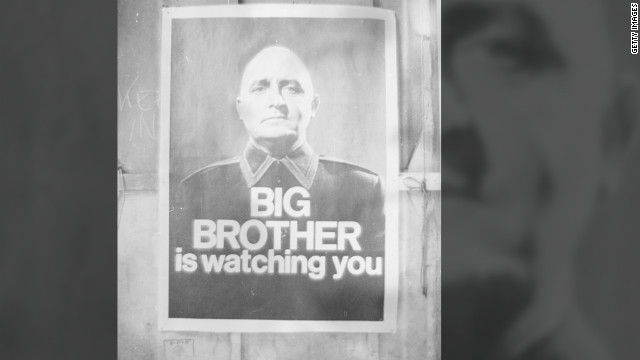
- Cashmore: The world of 2012 is reminiscent of Orwell's vision and radically at odds with it
- Today's online world is indeed allowing our every move to be tracked
- But self-improvement is easier when you're able to track your own activities
- The Internet gives citizens a valuable tool to combat overreaching governments
Editor's note: Pete Cashmore is founder and CEO of Mashable, a popular blog about tech news and digital culture. He writes regular columns about social media and tech for CNN.com.
(CNN) -- Last week was a remarkable one for the Web: A week that proved George Orwell's "Nineteen Eighty-Four" incredibly prescient yet woefully incorrect.
The online world is indeed allowing our every move to be tracked, while at the same time providing a counterweight to the emergence of Big Brother.
Nike last week announced the upcoming launch of the Nike FuelBand, a wristband that tracks your physical exercise and creates a "FuelScore" of your activity level. This score can optionally be shared with your friends on Twitter and Facebook.
Or how about the Fitbit Aria? Announced this month, this Internet-connected scale tracks your weight and provides the option to share it with friends on the Web.

These devices are part of a growing trend that tech watchers have labeled both "personal analytics" and "quantified self." The concept: Self-improvement becomes easier when you're able to track your own activities. Increasingly, consumers are tracking their every move and posting this data online.
Unlike in Orwell's dystopian world, however, people today are making a conscious choice to do so.
Or how about Facebook's new features? On Wednesday, the social networking site announced an expansion of its "Open Graph," allowing users to share more of what they do online automatically. Rather than hitting a button to share something, Facebook's Open Graph requires the user to authenticate an application only once. After that, it'll share everything you do on the application by default.
Among the activities Facebook wants you to share: Your travel plans, what you're eating, what you're cooking, what you're drinking (thanks to a wine app), what you're buying, the videos you're watching, the books you're reading, your location and more.
If this sounds invasive, remember that users choose to share all this information. Increasingly, it seems there's a demand for services that share every facet of your life.
The difference between this reality and Orwell's vision -- outlined in his chilling 1949 novel -- is the issue of control: While his Thought Police tracked you without permission, some consumers are now comfortable with sharing their every move online.
The past week's events also upturned Orwellian predictions of centralized power. Opponents of SOPA, a proposed anti-piracy bill, seeded a grass-roots uprising on social networks. This culminated in the temporary shutdown of Wikipedia, Reddit and other websites last Wednesday.
The aim: To demonstrate how untenable these user-generated websites would be if SOPA were passed. The online protest was extremely effective: On Friday, the chief sponsor of SOPA pulled the bill "until there is wider agreement on a solution."
The world of 2012 is both reminiscent of Orwell's vision and radically at odds with it. Connected lifestyles are creating a world in which sharing your activities may become the norm, albeit through choice and not coercion. And yet this connected society is also empowering people in new ways, providing a counterweight to big business and big government.
While Orwell correctly predicted that technological advances would let authorities track our lives, he failed to predict the inverse: That we would use these new technologies to keep an eye on them, too.
Related Video :
Video Rating: 4 / 5






{ 0 comments... Views All / Send Comment! }
Posting Komentar